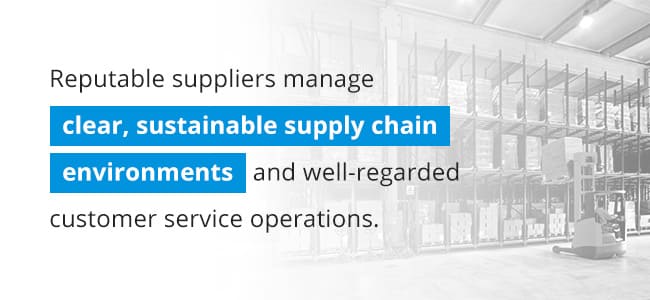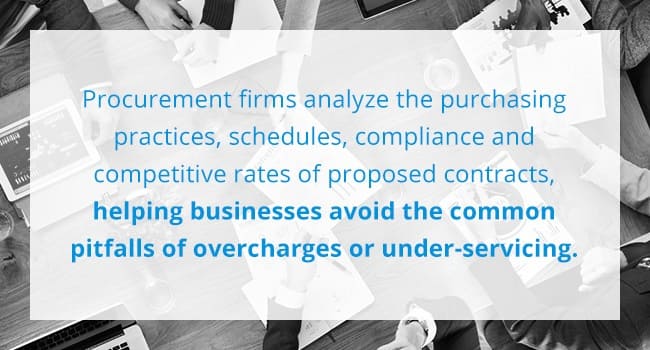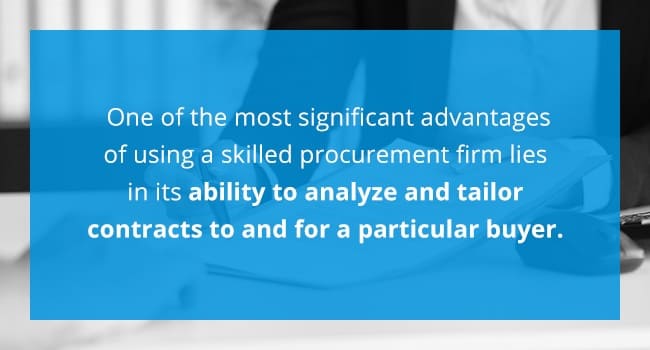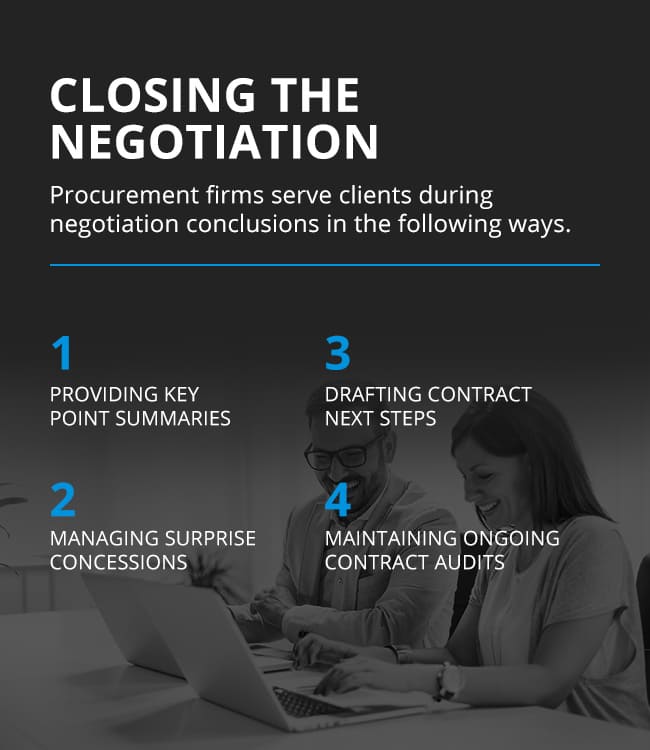Does Your Procurement Firm Have Vendor Negotiation Skills?
Last updated: December 17, 2023
Successfully negotiating a procurement contract means your organization, as the buyer, and your new vendor, as the supplier, have reached a mutually beneficial set of terms and conditions outlining your business deal.
However, what sounds like a standard contract agreement can produce friction when wants and needs misalign: timelines, deliveries, fees, price point protection, and even confusing contract language or terminology can create conflict that stalls the procurement process. You end up with a frustrating back-and-forth over products and services essential to your business' functionality — yet still out of reach.
This is where contract procurement firms step in to bridge buyer-supplier needs. In their role as mediators of end-to-end contract creation, these agencies have built careers out of the art and science of negotiation in procurement phases. They possess subtle negotiation skills for procurement, as well as research tools and database resources to leverage competitive benchmarking and industry data to your advantage.
Learn what vendor negotiation skills to look for in a procurement firm, plus how those skills help you prepare for your next contract negotiation.
Full Contract Vendor Negotiation Preparation and Planning
Contract procurement often begins when companies identify a process pain point or operational gap, such as:
Lack of technology to undertake a project, task or goal
Lack of subject matter experts or employees to tackle an undertaking or objective
Not enough capacity to produce a good or service entirely in-house
Outsourcing or horizontally integrating parts of the supply chain are more cost-effective than performing them in-house
Once an organization recognizes these cost opportunities, they initiate the formal procurement cycle. Contract procurement consultants play a crucial role here, as they assist in the comprehensive planning and auditing activities that take place even before you sit down with suppliers.
1. Research the Supplier
Procurement comes in two forms: direct and indirect.

With direct-procurement contracts, a buyer sources the physical parts, materials or services it needs to deliver branded products directly. Examples of this include a computer-chip manufacturer sourcing silicon or an organic snack company certifying its products through a testing lab.
With indirect-procurement contracts, buyers source goods and services that go into running broader operations. However, those operations may not contribute to the fabrication of their products, and therefore aren't "direct" acquisitions. Examples of indirect vendor contracts include hiring an outside marketing agency to create your advertisements or using an outsourced cloud-hosting service.
It's essential to research a supplier's direct and indirect expertise, as well as what industries it works with, past and present. Procurement firms can also assist in examining a supplier's leadership teams, organization structure and overall business reputation, providing context to procurement partnerships.
2. Review Contract Terms and Conditions
In particular, buyers and their procurement firms should review a contract draft for the following:
- Competitive pricing aligned with your spend budget
- Product or service delivery schedules
- Compliance with industry regulations
- Order quantity minimums and maximums
- Associated fees, add-ons, hidden costs, etc.
- Complicated, confusing or misleading terminology
- Maintenance, repairs and operations regarding ongoing supplier service obligations
- Overall appropriate product and servicing conditions and performance metrics
Procurement firms can help negotiate these initial contract reviews. Early contract audits provide the foundation for satisfying expectations and deliverables down the road and, as such, require thorough analysis and consultation to ensure you're starting negotiations on the right foot.
3. Consider the Supplier's Goals
Suppliers carry specific questions and objectives into each contract negotiation. After all, they're businesses too, with budgetary, operational and staff resources requiring profitable management on their ends.
Understanding the supplier's perspective is an often-overlooked negotiation skill that procurement firms provide. The deeper the firm can dig into the supplier's psyche, the better they can prepare their clients for effective, strategic offers and counteroffers.
Consider these top supplier concerns and goals during contract preparation:
Points of contact: Suppliers need to know whom to reach out to when questions or issues arise. Structured touchpoints and delegated connections beget open, clear communications that underlie all successful vendor-buyer relations.
Buyer evaluation criteria: Just as buyers use a checklist of characteristics to vet potential suppliers, you can bet suppliers do the same. What makes a buyer a particularly attractive client for a vendor? Do you meet that model? How can you communicate that you're the kind of client vendors should trip over to work with — beyond signing a lucrative contract?
Favorable performance objectives: What contract review schedules and structures appeal to the supplier? What metrics would they like to track, how often and by whom? Formulating these answers to performance objectives simplifies this often-challenging component to contract negotiation before it becomes prickly.
4. Review the Supplier's Performance
Reputable suppliers manage clear, sustainable supply chain environments and well-regarded customer service operations. They come highly rated by others in your industry — and even their competition — as well as in online reviews, industry publications and within professional circles.

Procurement firms can broaden background research into the stability and reputation of a vendor. Firms carry the tools and investigative resources to take an accurate temperature of potential suppliers, plus how that temperature might shape negotiations.
5. Complete a Marketplace Comparison
Competitive benchmarking provides a data-backed method to assess a contract draft. It compares procurement terms and conditions with related contracts in your industry or vertical market.
In performing a marketplace contract comparison through a procurement firm, buyers receive objective analysis on the pros, cons and overall fairness of a proposed agreement. When negotiations arise, they can wield benchmarked market insights to leverage more favorable terms and conditions.
6. Consider the Customer
Every stage of the contract procurement cycle should involve the question, "How is this helping our customers?" Prioritizing the user's perspective ensures that contract terms don't stray from your business principles. It also allows businesses to identify contract conditions that genuinely matter to their organization's values, as well as ones they're more lenient with. Procurement firms can help navigate through all this.
Capability to Identify Ideal Outcomes
The ability to target organization-specific, core contract outcomes is a top negotiation skill for procurement firms.
Agencies' capabilities to discern your ideal outcomes should cover the full needs spectrum, identifying both hard negotiation limits as well as the data-backed, ideal terms for your agreement.
What are these "wows" and "walk-aways" up for negotiation in procurement? Consider the top five ideal contract outcomes below:
1. Better Contract Terms
Procurement firms conduct a multi-staged, thorough audit of a proposed contract. Using a mix of marketplace analyses, competitive benchmarking, capabilities measurements and spend category calculations, they determine if a business has received fair contract terms.

In particular, procurement firms analyze the purchasing practices, schedules, compliance and competitive rates of proposed contracts, helping businesses avoid the common pitfalls of overcharges or under-servicing. The results are contract negotiation practices that don't ignore the inevitable differences in buyer and supplier goals, but mediate them in an informed, authoritative way.
2. Lower Costs
Negotiating procurement contracts cost-effectively is at the heart of profitable day-to-day business operations. Buyers must ensure that they're receiving the right quality and quantity of services at the ideal price points, with minimal cost variability, hidden fees or unforeseen add-on charges.
3. Heightened Process Efficiency
The vast majority of direct and indirect procurements initiate after a business identifies a process gap or pain point. Contract terms should explicitly state the process improvements buyers can expect from their suppliers. Organizations can negotiate the tracking of performance metrics to demonstrate these improvements, holding all parties responsible for the product or service promises relayed in early negotiations.
4. Flexibility, Scalability and Customization
How will prospective business developments and strategic plans — short and long term — effect contract deliverables? Does a contract maintain clear and open directives on updating it if a buyer's needs expand? Is the supplier in a position to scale with the buyer? These questions, and more, are part of the core contract outcomes a procurement firm walks clients through.
5. Rededication to Core Domains

Remember, core goals and domains will be company-specific. One of the most significant advantages of using a skilled procurement firm lies in its ability to analyze and tailor contracts to and for a particular buyer. The firm works intimately to understand what makes a company tick, then find and secure vendors appropriate for its profiles. The firm can even conduct ongoing audits to make sure contracts reflect a company's best interests across its evolution and broader market shifts.
End-to-End Procurement Negotiation Expertise and Activity
A procurement firm should demonstrate the following techniques as well as interpersonal savvy across the three main stages of contract procurement: opening, ongoing and closing contract negotiations.
1. Opening the Negotiation
At the onset of buyer-supplier negotiations, relationship-building and people-focused skills are essential. Backed by data from marketplace comparisons, benchmarking and spend category calculations, procurement firms should approach the negotiation table with objective information in hand to propose hard limits and core conditions — yet also with the communication finesse to make these limits and conditions seem fair and in everyone's interests.
During opening negotiations, a buyer can expect its procurement firm to display the following:
Preemptivity: Firms come prepared to represent their client's core goals and outcomes after a comprehensive, individualized review of current contract documentation and proposals. Extensive internal resources mean no target process remains unaudited.
Amiability: Starting a contract negotiation on a friendly note is only the first step. Procurement firms play an essential role in nurturing warm, engaged and professionally pleasant interactions between supplier and buyer, allowing both parties to feel heard and understood.
Timing: Procurement firms and their consultants understand when to talk and when to listen, when to ask questions and when to propose answers. They'll also know the best way to initiate negotiations and prompt one-way concessions, often ushering the supplier into talking and making proposals first — then positioning the buyer to competitively counteroffer.
Appropriate Q&As: The best negotiators understand the way to extract critical insights by asking suppliers the right questions, plus knowing how to ask them. These Q&A dynamics can affect the entire climate of negotiations, both before and during.
2. During the Negotiation
A procurement firm's attention and expertise all build to the moment of the actual contract agreement. While sitting at the negotiation table, a buyer can expect its procurement firm to initiate and assist in the following activities:
Pitching the initial offer: Whether pitching before or after the supplier — ideally after — a procurement firm's negotiation skill set can frame the perfect contract offer in the right language. The firm will cover product or service purchasing quantities, qualities, scheduling, compliance, ideal price rates and more. Then, the firm will pivot to allow any bargaining to begin.
Reiterating core needs and hard limits: Opening pitches will relay all negotiable terms and conditions, as well as those hard needs or "walk-away" situations to instill urgency.
Navigating counteroffers and concessions: Offers and counteroffers are commonplace to achieve optimal contract conditions, as are the concessions that surround them. A procurement firm has already helped its buyer strategize these appropriate agreements. Parties enter the negotiation table informed and confident, primed to navigate any supplier propositions.
Present industry acumen: Procurement firm representatives should be able to back up all negotiations with relevant industry data. After all, it's hard for a supplier to stand by terms or conditions that market data, industry statistics and competitive benchmarking all indicate as abnormal.
Remaining positive: Regardless of the direction negotiations may take, a procurement firm should maintain a professional, competent demeanor that contributes to a positive and productive atmosphere, always.
3. Closing the Negotiation
Once all parties have reached an agreeable set of contract conditions, procurement moves into its final phase: closing.
Procurement firms are particularly useful during contract closes for two reasons: first, they are fluent in picking up signals that a supplier is close to reaching a final offer and therefore seal the deal. Second — and more delicately — they can employ negotiation skills and interpersonal strategies to move the supplier toward finalizing the agreement, maintaining your core objectives and conditions along the way.
Procurement firms serve clients during negotiation conclusions in the following ways:

Providing key point summaries: A procurement firm can be the voice reiterating main objectives and contract points at the outcome of formal negotiations. This small measure puts a hard close on counteroffers, plus helps mitigate disagreements or confusion at the time of contract signing.
Managing surprise concessions: Some suppliers may take the final moments of contract negotiations to spring concession requests onto buyers. Procurement firms can assist their clients in assessing the nature of these last-minute requests, seeking alternative workarounds as well as contextualizing the importance of the demand. They can further step in to mediate these final moments of friction, conceding if the ask is unrelated to a critical objective or declining if it is, with a credible explanation.
Drafting contract next steps: While suppliers produce the majority of final contracts for parties to sign, procurement firms can perform one last contract review, as well as close any loops or answer lingering questions between buyer and supplier. They can also provide contract creation service if need be.
Maintaining ongoing contract audits: Some procurement firms will perform consistent or on-call contract audits once contracts have moved from procurement to management, furthering a buyer's confidence that it is getting what it needs, when it needs it, to run a smoother business.
Questioning Your Contracts, Current or Upcoming?
Procurement is an inevitable business process countless organizations face each year. Just because a process is essential, however, doesn't mean it's easy.
Dryden's 10-plus years in the cost-containment and spend-management consulting industry has honed one mission: to make your bottom line our top priority. That isn't a buzzy slogan, either — it's a commitment that draws its power from Dryden's comprehensive approach to data-backed commodity and cost-containment services, an approach that has saved clients over $1.5 billion.
Contact Dryden to learn more about contract negotiation and auditing services today.